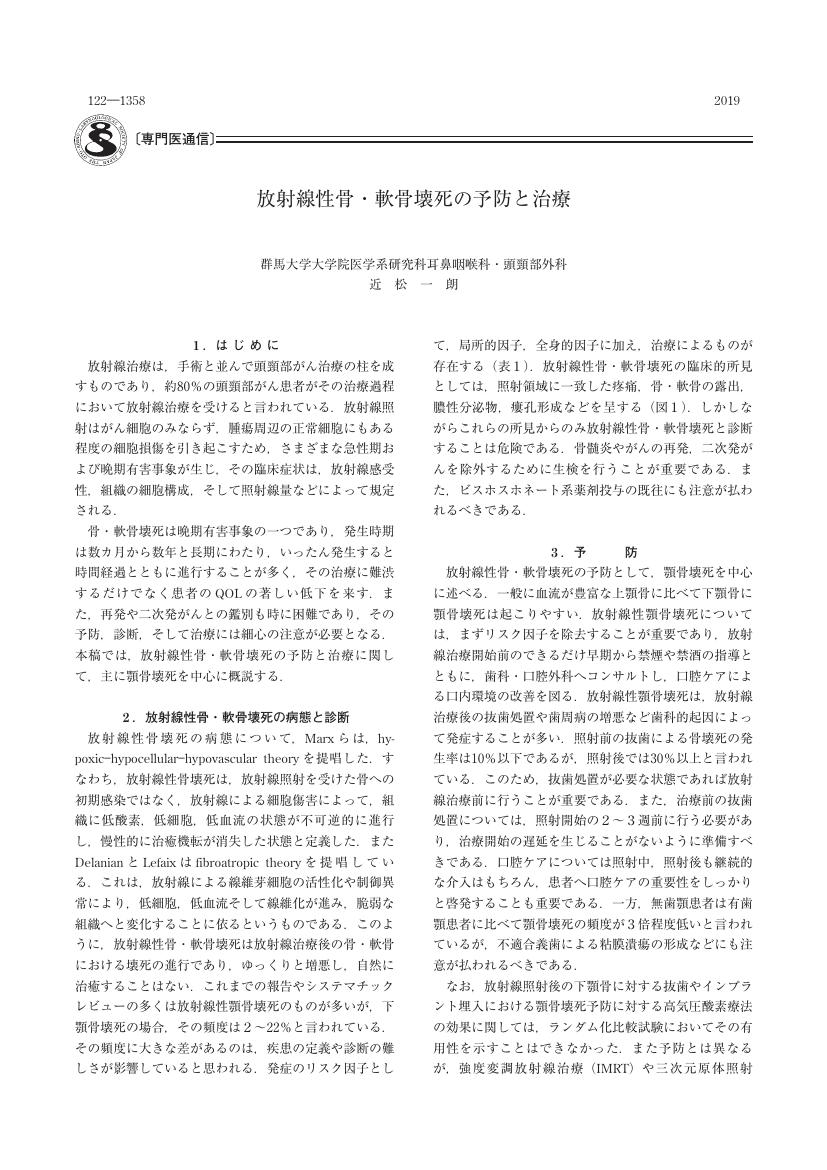78 0 0 0 OA 唾液中ヘルペスウイルス DNA 測定によるメニエール病発作期の肉体的疲労測定の試み
- 著者
- 高橋 克昌 岡本 彩子 新國 摂 岡宮 智史 紫野 正人 高安 幸弘 近松 一朗
- 出版者
- 一般社団法人 日本めまい平衡医学会
- 雑誌
- Equilibrium Research (ISSN:03855716)
- 巻号頁・発行日
- vol.74, no.1, pp.8-14, 2015-02-28 (Released:2015-04-01)
- 参考文献数
- 20
- 被引用文献数
- 2
The episodic vertigo of Meniere's disease is related to stress. Although the questionnaire method is useful in the evaluation of mental stress, it is hard to assess physical stress, in other words, fatigue. Human herpes virus-6 (HHV-6) and -7 (HHV-7) are the cause of Roseola infantum. Latent infection of those viruses is established in all Japanese adults, and viruses are re-activated and secreted into saliva under conditions of severe fatigue. Detection of HHV-6 DNA in saliva represents short-term fatigue which lasts for a week, and that of HHV-7 DNA indicates long-term fatigue which lasts for a month. Objective evaluation of fatigue is achieved by measurement of the levels of HHV-6 and 7 DNA in saliva. Patients who suffered from vertigo attacks within a week were divided into two groups, namely Meniere's disease with depression (D (+) Meniere) and without depression (D (-) Meniere), using questionnaires and investigation of mental problems. Saliva samples were collected, and viral DNA was amplified with the Loop mediated isothermal amplification method using specific primers as reported previously. HHV-7 DNA was detected at the high rate of 89% in the D (-) Meniere group, whereas it was 17% in the D (+) Meniere group, and 0% in healthy subjects. HHV-6 DNA was also detected at a higher rate of 64% in the D (-) Meniere group compared with 17% in the D (+) Meniere group and 33% in healthy subjects. A high rate of virus DNA in saliva indicated accumulated fatigue in Meniere's disease patients.
2 0 0 0 OA 誤嚥防止術:喉頭気管分離術(気管弁法の改良と展望)
- 著者
- 安岡 義人 紫野 正人 二宮 洋 近松 一朗
- 出版者
- 日本小児耳鼻咽喉科学会
- 雑誌
- 小児耳鼻咽喉科 (ISSN:09195858)
- 巻号頁・発行日
- vol.37, no.3, pp.268-273, 2016 (Released:2017-03-23)
- 参考文献数
- 13
小児の反復する難治性嚥下性肺炎予防のための誤嚥防止術には種々の術式がある。喉頭気管分離術は気管食道吻合術と共に,小児の誤嚥防止術として最も広く普及し施行されている術式である。筆者らは気管を切断せず,気管前壁のU字気管弁を後方に折り曲げ気管後壁と側壁に縫合して気管閉鎖する喉頭気管分離術(気管弁法)を開発し施行している。 気管弁法は低侵襲で簡便なため本人・家族が受け入れやすく,術後の管理が容易で気管孔が安定しているなどの利点がある。今回,気管弁法の術式の改良を行い,小児,成人,気管切開後にも適応を拡大し,喉頭気管瘻や気管腕頭動脈瘻のリスクも軽減させることのできる応用範囲の広い術式とした。さらに,誤嚥防止術の枠を超え,嚥下機能改善や,食道–喉頭シャントにより声帯発声が展望できる術式を目指している。
2 0 0 0 OA 放射線性骨・軟骨壊死の予防と治療
- 著者
- 近松 一朗
- 出版者
- 一般社団法人 日本耳鼻咽喉科学会
- 雑誌
- 日本耳鼻咽喉科学会会報 (ISSN:00306622)
- 巻号頁・発行日
- vol.122, no.10, pp.1358-1359, 2019-10-20 (Released:2019-11-06)
- 参考文献数
- 2
- 被引用文献数
- 3
1 0 0 0 OA 鼻茸患者に対するNSAIDsの取り扱い方
- 著者
- 松山 敏之 多田 紘恵 近松 一朗
- 出版者
- JAPAN SOCIETY OF IMMUNOLOGY AND ALLERGOLOGY IN OTOLARYNGOLOGY
- 雑誌
- 耳鼻咽喉科免疫アレルギー (ISSN:09130691)
- 巻号頁・発行日
- vol.37, no.3, pp.229-232, 2019 (Released:2019-09-20)
- 参考文献数
- 17
- 著者
- 安岡 義人 中島 恭子 村田 考啓 紫野 正人 近松 一朗
- 出版者
- 日本小児耳鼻咽喉科学会
- 雑誌
- 小児耳鼻咽喉科 (ISSN:09195858)
- 巻号頁・発行日
- vol.36, no.3, pp.374-380, 2015 (Released:2016-03-31)
- 参考文献数
- 10
過去 6 年間に当科外来を受診した15歳以下の小児鼻出血77例の血管病態を電子内視鏡の通常光と狭帯域光観察(narrow band imaging: NBI)を用いて診断し,好発部位と血管形態別 6 型分類の特徴を明らかにした。好発部位は95%以上が鼻中隔前下方皮膚粘膜移行部付近とキーゼルバッハ部であった。血管形態分類では線状型(linear type)39例(50.6%),網状型(reticular type)34例(44.2%),肉芽型(granular type)2 例(2.6%),点状型(punctate type)1 例(1.3%),瘤型(aneurysmal type)1 例(1.3%)で陥凹型(recessed type)は該当例がなく,静脈性出血であった。小児の鼻出血の好発部位と血管病態に基づき,小児の鼻出血の初期対処法は患側の母指で鼻翼を正中の鼻中隔に圧迫し,手掌は開き他 4 指を対側下顎角部に当て挟む,母指圧迫止血法:thumb press maneuver (TPM)が合理的で効果的な止血法である。
1 0 0 0 OA スギ舌下免疫療法による臨床効果とQOL及び満足度との関係
- 著者
- 松山 敏之 竹越 哲男 髙橋 秀行 近松 一朗
- 出版者
- 日本鼻科学会
- 雑誌
- 日本鼻科学会会誌 (ISSN:09109153)
- 巻号頁・発行日
- vol.61, no.2, pp.310-316, 2022 (Released:2022-07-20)
- 参考文献数
- 8
アレルギー性鼻炎の有病率は年々増加し,長期寛解,治癒が望めるアレルゲン免疫療法は,今後ますます重要な治療法になると考えられる。今回我々は,スギ舌下免疫療法(SLIT)により改善した症状とQOL(quality of life)及びSLITの満足度との関係について検討を行った。2014年11月から2017年12月までの間にスギ舌下免疫療法を開始し,2019年2月1日まで継続治療できた39症例を対象とした。2019年スギ花粉飛散後にSLIT開始前とSLIT後の症状スコア,QOLスコア,SLITの満足度の調査を行った。鼻水,くしゃみ,鼻閉,眼のかゆみの評価したすべての症状でSLIT後に症状スコアの改善がみられた。QOLスコアにおいて評価したすべての項目でSLIT後に改善がみられた。治療前の症状スコアとQOLスコアの間には多くの項目で有意な相関を認めた。治療前の症状スコアは高満足群,低満足群の2群間に有意差はなかったが,治療前後のスコアの改善幅はくしゃみ,鼻閉,眼のかゆみの3症状で2群間に有意差がみられた。症状の改善幅が大きいとSLITの満足度は高くなってくると思われた。症状スコアの改善幅が高満足群と低満足群の2群間で有意差があった3症状について,高満足度への寄与度を多変量解析にて検定すると,治療前後での鼻閉スコアの改善幅が大きいことが満足度に最も寄与した。SLITの満足度に最も影響を及ぼすのは,鼻閉症状の改善であると思われた。
1 0 0 0 頭頸部腫瘍に対する重粒子線治療
- 著者
- 白井 克幸 横尾 聡 中野 隆史 大野 達也 齋藤 淳一 武者 篤 阿部 孝憲 赤羽 佳子 小林 なお 小林 大二郎 近松 一朗
- 出版者
- 日本頭頸部癌学会
- 雑誌
- 頭頸部癌 (ISSN:13495747)
- 巻号頁・発行日
- vol.45, no.1, pp.25-29, 2019
重粒子線治療は良好な線量分布を持ち,高い生物学的効果を有している。従来X線抵抗性と考えられている頭頸部非扁平上皮癌(腺様嚢胞癌,腺癌など)や,粘膜悪性黒色種,骨軟部腫瘍に対して,優れた局所制御率が報告されている。本邦の重粒子線治療施設は5施設と世界最多であり,その治療技術や研究開発において指導的役割を果たしている。これまでは重粒子線治療は単施設による報告に限られていたが,2014年より日本炭素イオン線治療臨床研究グループ(J-CROS)が組織され,多施設共同臨床研究を通じて頭頸部腫瘍に対する重粒子線治療の包括的な有効性や安全性が報告されてきた。これまで重粒子線治療は先進医療として行われてきたが,これらの本邦からのエビデンスをもとに,2018年から頭頸部悪性腫瘍(口腔・咽喉頭の扁平上皮癌を除く)が保険適用となっている。今回の総説では,頭頸部腫瘍に対する重粒子線治療の概要,これまでの治療成績ならびに今後の展望について概説する。
1 0 0 0 OA 免疫療法
- 著者
- 近松 一朗
- 出版者
- 耳鼻と臨床会
- 雑誌
- 耳鼻と臨床 (ISSN:04477227)
- 巻号頁・発行日
- vol.60, no.Suppl.1, pp.S63-S69, 2014-11-01 (Released:2016-01-08)
- 参考文献数
- 15
がん抗原が同定されて以来、ここ 20 年程の間にがんに対する免疫病態が解明され腫瘍免疫学の分野は大きく発展してきた。これらの知見を基にさまざまながん免疫療法が開発され、その臨床試験の数は年々増加している。そのような中、第Ⅲ相臨床試験においていくつかの免疫療法の治療効果が示されたことにより、アメリカ食品医薬品局 (Food and Drug Administration:FDA)は 2010 年に転移性ホルモン抵抗性前立腺癌の治療として自家細胞免疫療法である Sipuleucel-T (Provenge)を、2011 年にメラノーマに対して抗 cytotoxic T-lymphocyte antigen 4 (CTLA-4) 抗体である Ipilimumab を承認した。その他にも大規模あるいは多施設での臨床試験にて治療効果を示す免疫療法が確立されつつある。今後、さらにがん細胞の免疫抵抗性や免疫抑制機構の克服を目指してさまざまな免疫療法の開発が進められ、本療法が頭頸部癌の臨床の現場に登場してくる日も近いと思われる。本稿では、最近のこの分野についてのトピックスとして、がん免疫編集、がんワクチン療法、細胞療法 (キメラ抗原受容体 〔chimeric antigen receptor:CAR〕 発現 T 細胞療法)、抗体療法 (免疫チェックポイント阻害剤) について述べる。
1 0 0 0 がん免疫療法に関する最近の話題
- 著者
- 近松 一朗 増山 敬祐
- 出版者
- 耳鼻咽喉科臨床学会
- 雑誌
- 耳鼻咽喉科臨床 (ISSN:00326313)
- 巻号頁・発行日
- vol.105, no.2, pp.87-94, 2012 (Released:2012-02-01)
- 参考文献数
- 32
- 被引用文献数
- 1
Cancer immunotherapy is designed to activate and up-regulate the host immune responses against tumor cells and is currently in use or under investigation for cancer treatments. Although tumor cells can use a variety of mechanisms to create an immunosuppressive environment, many agents and strategies to reduce or eliminate tumor-induced immune suppression are either being developed or already in clinical trials. This review deals with recent advances in cancer immunotherapy, focusing on new strategies to enhance antitumor immunity. Numerous approaches have been tested for the development of therapeutic cancer vaccines. Recently, several promising reports suggest that clinical benefit has been shown in randomized phase III trials for vaccines against prostate cancer, follicular lymphoma, and melanoma. Moreover, in 2010, the first patient-specific immunotherapy (sipuleucel-T) was approved by the FDA for the treatment of prostate cancer. On the other hand, some chemotherapeutic agents such as cyclophosphamide and docetaxel, have direct effects on the immune system that is likely to contribute to an improved antitumor immunity. Therefore, cancer immunotherapy combined with chemotherapy may represent one approach for breaking tumor-induced immune suppression. To date, a number of monoclonal antibodies are in use or under evaluation. Among these antibodies, blocking negative immunoregulatory receptors, CTLA-4 and PD-1, also represent a new strategy to induce antitumor immunity by manipulation of the immune system. In clinical trials, these antibodies could increase anti-tumor T-cell immunity and result in objective tumor regression in some patients. Thus, accumulating data from recent cancer vaccine trials, the manipulation of immune suppression using chemotherapeutic agents, and the use of immune-stimulatory antibodies raise the hope that immunotherapy could become the fourth modality of cancer treatment. Based on these new findings, in our hospital, a clinical trial using dendritic cells combined with low dose cyclophosphamide and docetaxel in patients with relapsed and refractory head and neck squamous cell carcinoma is under way (UMIN000003725, ClinicalTrials.gov identifier, NCT01149902). In the near future, various immunotherapeutic modalities will most probably be applied as novel approaches in the treatment of head and neck cancer.

